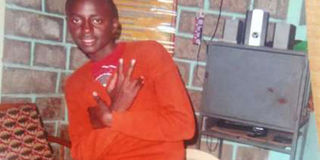Contradictory accounts over death of teenagers

Felix Mbugua was killed by a mob of boda boda riders on February 2016 alongside Ayub Muchangi, 16, Christopher Mwaura, 16 and Silas Odipo, 17, claiming they were thieves. PHOTO | NATION MEDIA GROUP
What you need to know:
- At the time of their deaths, Kamau and Cuba were affiliated with Maisha Poa, an organisation that rehabilitates former street boys.
- Kamau was born and raised in Kanyariri, Kiambu. According to his uncle, Charles Karanja, he wanted to be a mason, like his father, and his future looked bright.
- Mbugua’s family has filed a complaint with the Independent Policing Oversight Authority, accusing the officers of extra-judicial killings.
In the wee hours of a Thursday morning late last month, six youngsters were killed in cold blood by a mob of boda boda riders in Dagoretti.
The boys, all under 19, were cornered in a small room where two of them used to stay and beaten to death by a mob that accused them of stealing.
The one who attempted to flee was gunned down by police.
According to the owner of the mabati shack, the scene looked like a slaughterhouse once the mob was done with the teens.
“I heard a commotion around 3am at my rental property. I could also hear gunshots and the revving of motorbikes. I chose to wait in the house until the commotion died because I feared for my safety,” Mr David Njoroge, the landlord, said.
He ventured out at 6am and made his way through the crowds to the room he had rented to the youngsters.
“There was blood everywhere. Blood was on walls, floor, doors and windows. Their bedding and clothes were soaked,” he said.
He asked volunteers to burn everything the boys owned because nothing could be salvaged.
He said he paid people to clean the house but when the Nation visited the scene a week later, the walls and floor were still stained with blood.
Mr Njoroge said two boys; Joseph “Cuba” Rashid and John Kamau, rented the single-room in May last year. He said he had no problems with them and said they were well-behaved.
“I hear people saying the boys were members of a gang that stole soda and water from a shop. I have trouble believing that,” he said.
SEVERED PLANS
At the time of their deaths, Kamau and Cuba were affiliated with Maisha Poa, an organisation that rehabilitates former street boys.
Cuba was a casual labourer at the rehabilitation centre. He was an orphan with no known relatives and would often joke that he “sprouted from the ground like a mushroom”.
Through Maisha Bora efforts, Cuba went to secondary school but dropped out in Form Two. At the time of his death, the 19-year-old was about to join a vocational training institute in Kilimambogo.
“He was an arts-oriented young man and was always our master of ceremony during functions,” said Pastor Mary Muturi of Maisha Poa.
“He was always ready to welcome guests. We trusted him with office property and we would pay him some little money to keep him going.”
In an effort to rebuild his life, Cuba rented the house at Kabiria slum and welcomed 16-year-old Kamau, also a former street boy who dropped out of school in Standard Six.
Before his death, Kamau, like Cuba, had made plans to go back to school and was poised to join Standard Seven at Winners Academy, Loitoktok.
Kamau was born and raised in Kanyariri, Kiambu. According to his uncle, Charles Karanja, he wanted to be a mason, like his father, and his future looked bright.
“He had never stolen anything from anyone. He went to Satellite Primary School until Standard Six and he was ready to join a new school,” he said.
FAMILY'S AGONY
Pastor Muturi said the boy was to join school a week before his death. According to neighbours who witnessed the killings, Cuba and Kamau were not involved in the robbery.
The neighbours said the boys were asleep when their four friends stormed the room, with the boda bodas in pursuit.
Mr Harrison Ingadi, an administrator at Maisha Poa, was among the first to be called to the scene.
“The landlord called at 3am to say he heard noise from the room. An hour later, he called to update me and said the boys were gone. I thought it was just Cuba and Kamau,” says Mr Ingadi.
The four others who died were Felix Mbugua, 18, Ayub Muchangi, 16, Christopher Mwaura, 16 and Silas Odipo, 17. Mbuguah was killed by police when he attempted to flee.
His father, James Ngige — a truck driver — refuted the police account that the boy was a thief.
He said Mbugua had gone out to meet friends when he was killed. Mbugua was a Form 3 student at JIA Children’s Centre, Kitengela.
He was being sponsored by well-wishers. At the time of his death, Mbugua was on mid-term break and had gone to visit his maternal grandmother, Beatrice Njoki.
“He was supposed to return to school the next day. I was called at 5am and told that he had been killed. I could not even bring myself to look at the body,” said Ms Njoki, describing Mbugua as a happy and active young man.
“Neighbours who witnessed the killings said our children begged for their lives,” said Mr Ngige.
SUICIDAL ACT
Mbugua’s family has filed a complaint with the Independent Policing Oversight Authority, accusing the officers of extra-judicial killings.
“We are investigating the Dagoretti case with a view to unravelling circumstances leading to the shooting,” said Mr Dennis Oketch, Ipoa head of communications.
Dagoretti police boss Rashid Mohammed said Mbugua was shot because he was firing at the officers.
“Police confronted them and asked them to surrender but they took off. The one who had a home-made pistol kept firing as they fled,” said Mr Mohammed.






